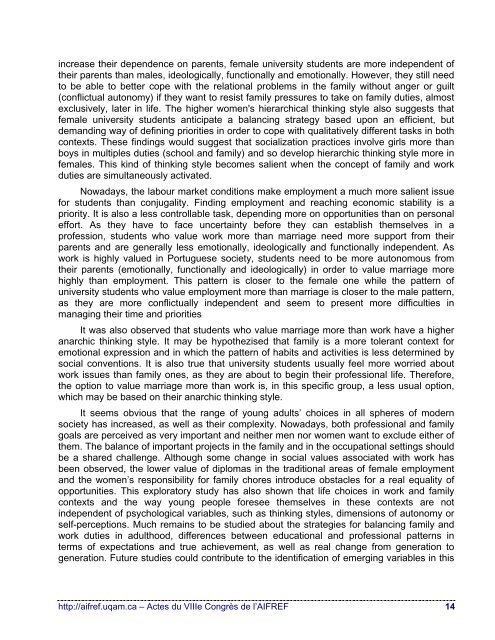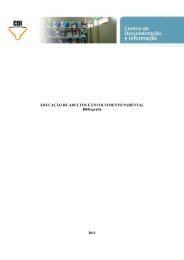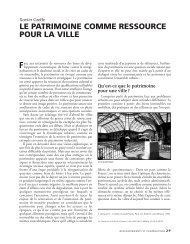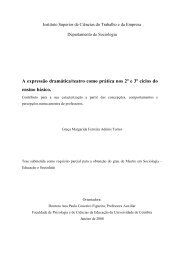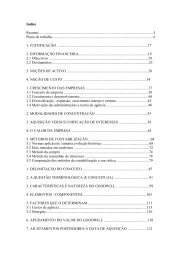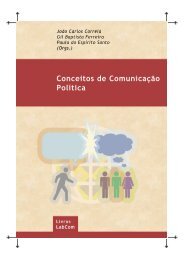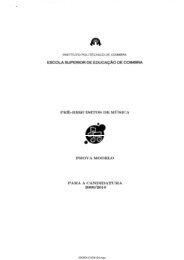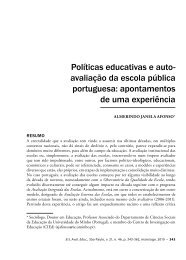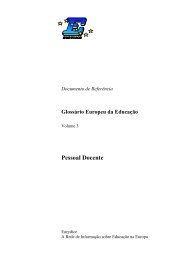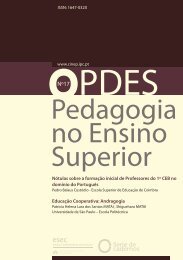BALANCING FAMILY AND WORK ROLES : EXPECTATIONS OF ...
BALANCING FAMILY AND WORK ROLES : EXPECTATIONS OF ...
BALANCING FAMILY AND WORK ROLES : EXPECTATIONS OF ...
You also want an ePaper? Increase the reach of your titles
YUMPU automatically turns print PDFs into web optimized ePapers that Google loves.
increase their dependence on parents, female university students are more independent oftheir parents than males, ideologically, functionally and emotionally. However, they still needto be able to better cope with the relational problems in the family without anger or guilt(conflictual autonomy) if they want to resist family pressures to take on family duties, almostexclusively, later in life. The higher women's hierarchical thinking style also suggests thatfemale university students anticipate a balancing strategy based upon an efficient, butdemanding way of defining priorities in order to cope with qualitatively different tasks in bothcontexts. These findings would suggest that socialization practices involve girls more thanboys in multiples duties (school and family) and so develop hierarchic thinking style more infemales. This kind of thinking style becomes salient when the concept of family and workduties are simultaneously activated.Nowadays, the labour market conditions make employment a much more salient issuefor students than conjugality. Finding employment and reaching economic stability is apriority. It is also a less controllable task, depending more on opportunities than on personaleffort. As they have to face uncertainty before they can establish themselves in aprofession, students who value work more than marriage need more support from theirparents and are generally less emotionally, ideologically and functionally independent. Aswork is highly valued in Portuguese society, students need to be more autonomous fromtheir parents (emotionally, functionally and ideologically) in order to value marriage morehighly than employment. This pattern is closer to the female one while the pattern ofuniversity students who value employment more than marriage is closer to the male pattern,as they are more conflictually independent and seem to present more difficulties inmanaging their time and prioritiesIt was also observed that students who value marriage more than work have a higheranarchic thinking style. It may be hypothezised that family is a more tolerant context foremotional expression and in which the pattern of habits and activities is less determined bysocial conventions. It is also true that university students usually feel more worried aboutwork issues than family ones, as they are about to begin their professional life. Therefore,the option to value marriage more than work is, in this specific group, a less usual option,which may be based on their anarchic thinking style.It seems obvious that the range of young adults’ choices in all spheres of modernsociety has increased, as well as their complexity. Nowadays, both professional and familygoals are perceived as very important and neither men nor women want to exclude either ofthem. The balance of important projects in the family and in the occupational settings shouldbe a shared challenge. Although some change in social values associated with work hasbeen observed, the lower value of diplomas in the traditional areas of female employmentand the women’s responsibility for family chores introduce obstacles for a real equality ofopportunities. This exploratory study has also shown that life choices in work and familycontexts and the way young people foresee themselves in these contexts are notindependent of psychological variables, such as thinking styles, dimensions of autonomy orself-perceptions. Much remains to be studied about the strategies for balancing family andwork duties in adulthood, differences between educational and professional patterns interms of expectations and true achievement, as well as real change from generation togeneration. Future studies could contribute to the identification of emerging variables in thishttp://aifref.uqam.ca – Actes du VIIIe Congrès de l’AIFREF 14


